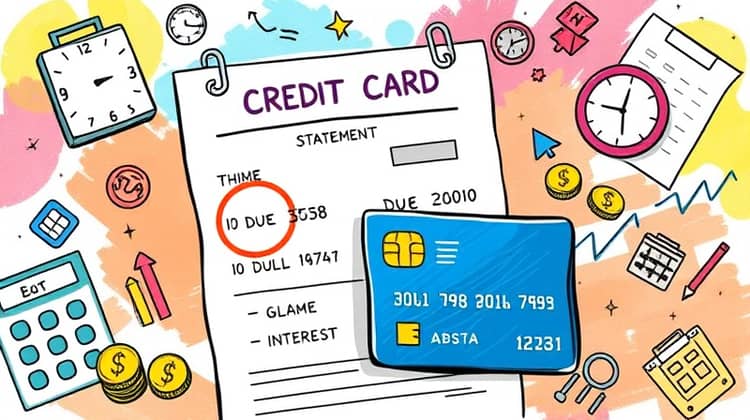Credit Card Grace Periods: What They Are and How to Make the Most of Them

Credit card grace periods are an important feature that can help cardholders save money and manage their finances more effectively. Understanding how grace periods work is essential for anyone who wants to maximize their credit card benefits. In this article, we will explore what grace periods are, how they function, and ways to take advantage of them.
Many consumers may not fully grasp the concept of a grace period or how it can impact their financial situation. A grace period essentially gives you a window of time to pay off your balance before interest charges apply. This period can be a lifeline for those looking to budget their expenses or avoid paying finance charges on their purchases.
With the right information, you can make informed decisions about your credit card usage and avoid unnecessary fees. By understanding the nuances of grace periods, you can optimize your credit card payments and ultimately improve your financial health.
What is a Grace Period?

A grace period refers to the time frame in which a borrower can make a payment without incurring a penalty or additional interest charges. In the context of credit cards, this typically applies to new purchases made during the billing cycle if the previous balance is paid in full by the due date.
Most credit cards offer a grace period that lasts from the end of the billing cycle to the payment due date. This period can usually be anywhere from 21 to 25 days. If you manage to pay off your entire balance during this time, you won’t owe any interest on your new purchases.
However, if you carry a balance from the previous month, you will not receive a grace period on new purchases, and interest will start accruing immediately. This is why it’s crucial to pay your credit card balance in full whenever possible to take advantage of the grace period.
How Grace Periods Work

To better understand how grace periods work, it helps to look at the billing cycle for your credit card. Each month, the credit card issuer provides a statement that lists the total amount owed and the due date for the payment.
When your billing cycle ends, you’ll receive a statement showing your balance and the grace period. If you pay your balance in full by the due date, any new charges made during that billing cycle will not accrue interest. If you don’t pay off the balance in full, you will be charged interest on the total outstanding debt, including new purchases.
This process incentivizes cardholders to pay their balances on time and in full, as it encourages responsible credit usage and financial discipline. Understand the terms specific to your card, as different cards may have variations in how grace periods are applied.
Benefits of a Grace Period

The primary benefit of a grace period is the opportunity to avoid paying interest on new purchases. This can translate into significant savings, especially for those who use their credit cards frequently but pay their bills on time.
Furthermore, having a grace period can assist in financial planning; it provides a buffer period to manage your finances without the rush to pay immediately after the billing cycle ends. This flexibility can be especially helpful in managing cash flow during tough financial times.
- Avoid paying interest on your purchases
- Assist in budgeting and cash flow management
- Improve your credit score by paying on time
Overall, a grace period can be a beneficial feature for credit card holders, especially those who are diligent about their payment habits. By understanding and utilizing it, you can enhance your consumer satisfaction and financial wellbeing.
Grace Period vs. Deferred Interest

While grace periods can help you avoid interest charges, it’s essential to distinguish them from deferred interest offers. Deferred interest is a type of financing offer that allows consumers to finance a purchase without making payments for a certain period of time.
However, if the balance isn’t paid off before the deferred interest period ends, all accumulated interest is applied retroactively, often resulting in a substantial financial obligation. In contrast, grace periods allow you to avoid paying interest altogether if you pay off your balance in full before the deadline.
Understanding the difference between these two concepts is crucial for consumers aiming to make the best financial decisions regarding their credit cards.
Factors That Can Affect Your Grace Period

Several factors can influence the availability of a grace period on your credit card. Firstly, the specific credit card issuer’s policies can differ widely, so it’s essential to read the terms and conditions associated with your card.
Secondly, your payment history and the overall state of your account can impact your eligibility for a grace period. A consistent history of late payments may disqualify you from receiving this benefit.
- Credit card issuer policies
- Payment history
- Account status
Understanding these factors can help you maintain a grace period and make informed choices regarding your credit card usage and payments.
How to Maintain Your Grace Period

To ensure that you keep your grace period, it’s essential to adopt good credit habits and manage your finances prudently.
- Always pay your balance in full by the due date
- Stay aware of your billing cycle and statement dates
- Communicate with your credit card issuer if you encounter financial difficulties
By following these steps, you can maintain your grace period and enjoy the benefits that come with it.
Why Some Cards Don’t Have Grace Periods

Not all credit cards come with grace periods. Some cards, especially those aimed at high-risk borrowers or those with higher interest rates, may not offer grace periods. This is largely due to their business model and risk management strategies.
Additionally, certain card types such as those designed for financing specific purchases, like store credit cards, may have different terms that don't include a grace period. In these cases, interest may begin accruing immediately on purchase date, regardless of payment history.
Understanding why your credit card may lack a grace period can help you choose financial products that align better with your spending habits and repayment abilities.
Tips for Making the Most of Your Grace Period

To maximize the benefits of your grace period, it’s crucial to adopt certain strategies that simplify your financial management.
- Set reminders for payment deadlines
- Review your bills to ensure you're within your budget
- Use a budgeting app to track your expenses and due dates
By implementing these tips, you can enjoy the benefits of your grace period without the stress of worrying about interest charges.
Conclusion

In conclusion, credit card grace periods are a valuable feature that can greatly benefit consumers who understand how to use them effectively. By paying attention to the billing cycle and making timely payments, you can avoid unnecessary interest that adds to your debt.
Moreover, grace periods offer flexibility in managing your finances, allowing you to budget better and reduce financial strain. By employing strategies to maintain your grace period and understanding the factors that affect it, you can make the most of your credit card usage.
Ultimately, being financially savvy about grace periods can empower you to utilize credit wisely, leading to enhanced financial stability and peace of mind.






